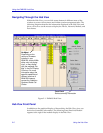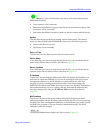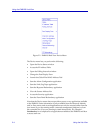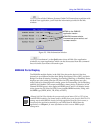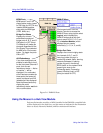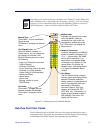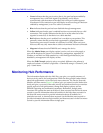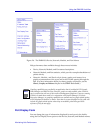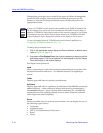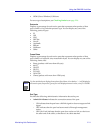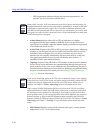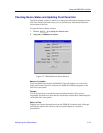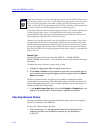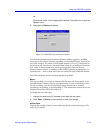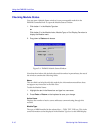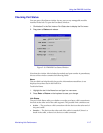
Using the EMM-E6 Hub View
2-10 Monitoring Hub Performance
Changing the port display form via the Device menu will affect all manageable
ports in the hub; using the Network menu will affect all ports on a specific
channel, or network; and using the Module menu will affect all ports on the
appropriate module.
To change the port display form:
1. Click in the appropriate area to display the Device, Network, or Module menu
(refer to Figure 2-5, page 2-7).
2. Drag down to Port Display Form, then right as necessary to select one of the
port display options. The current selection will be displayed in the Port Display
Form text box(es) on the module displays.
Port display form options are:
Load
Shows a percentage for each active port that represents that port’s portion of the
theoretical maximum traffic level — for Ethernet networks, 10 megabits per
second.
Traffic
Displays port traffic data in a packets/second format.
Collisions
Displays port traffic data in a collisions/second format. The EMM-E6 counts both
receive collisions — those collisions it detects while receiving a transmission —
and transmit collisions —those it detects while transmitting (i.e., the EMM-E6
transmitted one of the colliding packets); however, those counts are combined
and a single total value is displayed.
Errors
Shows port traffic errors in an errors/second format. You can display any one of
the following types of errors:
• Total errors
• Alignment errors
• CRC (Cyclic Redundancy Check) errors
• Runts
• Giants
NOTE
If there is a TPXMIM in multi-channel mode installed in your EMM-E6-managed hub,
the Port Display Form option will not be available from that MIM’s Network menu; in
addition, a TPXMIM in multi-channel mode will not respond to changes in Port Display
Form made via any other MIM’s Network menu. However, the TPXMIM will always
respond to changes in port display form initiated via the Module or Device menus.
For more information about the TPXMIM and its multi-channel capabilities, see
Configuring TPXMIM Connections, page 2-30.



